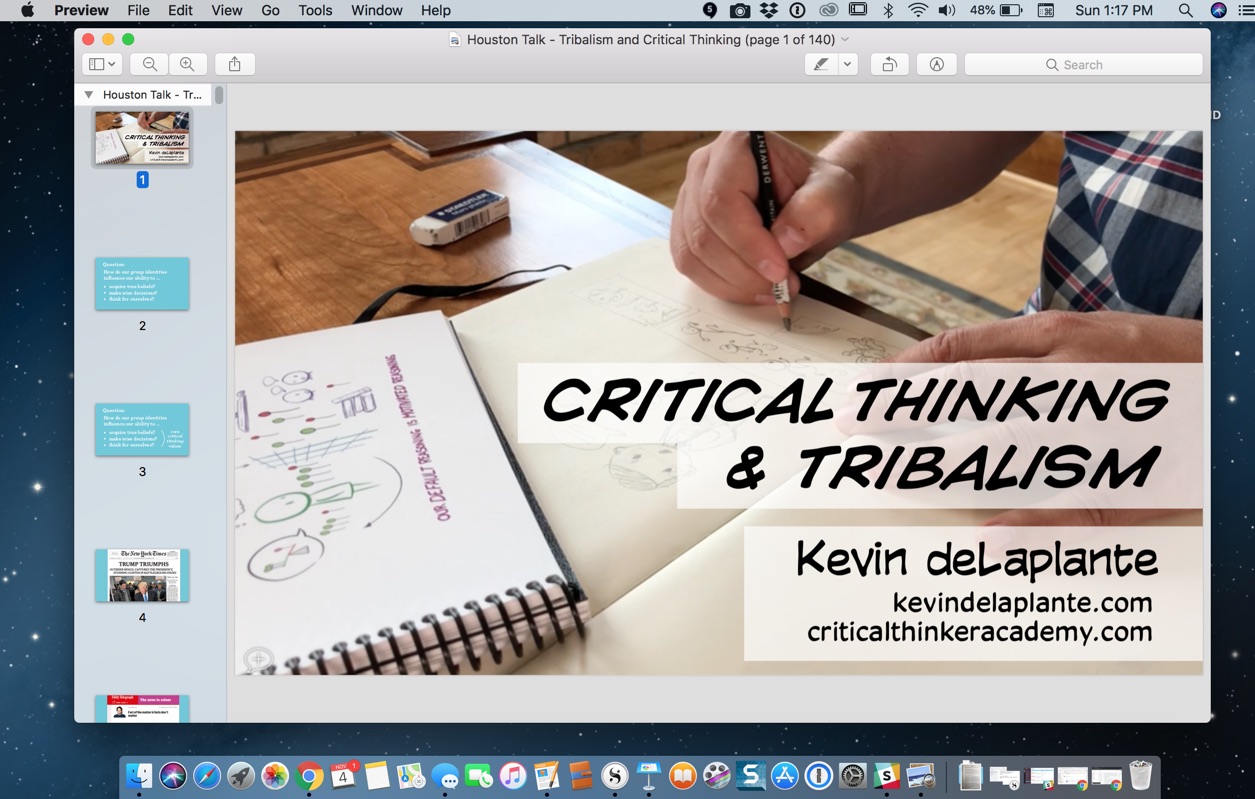In this set of videos I present a framework for thinking about how polarized political and cultural environments interact with our natural tribal psychology to create “pathological tribalism”. I show how under pathological tribalism our ability to think critically and independently is compromised. Polarized environments are hostile to critical thinking. (What a shock!)
Scroll down to view the YouTube videos embedded below. Scroll even farther down to read the notes and references on the content presented in those videos.
I’d like to thank all of my patrons on Patreon, without whose support I could not produce these videos! If you like what you see and want more, please consider becoming a Patron!
https://patreon.com/kevindelaplante
Topics Covered in These Videos:
1. Cognitive Biases, Tribalism and Politics (Part 1 of 3): We Can Value More Than One Kind of Thing
https://youtu.be/2NjOzvM41zM
- the “two movies” phenomenon (Scott Adams)
- the distinction between “psychological” value pluralism and “philosophical” value pluralism
- what is affect bias?
- what is cultural cognition?
- your “value channel profile”
2. Cognitive Biases, Tribalism and Politics (Part 2 of 3): Attention, Focus and Exaggeration
https://youtu.be/M4x4p3kmWQc
- what is the focusing illusion?
- what is availability bias?
- what is the mere-exposure effect?
- how do these cognitive biases interact to create an exaggerated and distorted perception of reality?
3. Cognitive Biases, Tribalism and Politics (Part 3 of 3): How Polarization Makes Us Mean and Stupid
https://youtu.be/PIAJxU5DO7s
- a three-channel model of political values
- value channel profiles for the libertarian, the progressive liberal, and the conservative
- can I be a libertarian AND a progressive liberal AND a conservative?
- sources of “pathological tribalism”
- analogy: Black Mirror, “Men Against Fire”
- trading off critical thinking values and political values
FYI, Patrons on Patreon get access to all of the video tutorial content over at the Critical Thinker Academy:
https://criticalthinkeracademy.com
Subscribe to my podcast (the Argument Ninja Podcast):
https://apple.co/2RDvN9G
Follow on Facebook:
https://facebook.com/CriticalThinkerAcademy
Follow on Twitter:
https://twitter.com/kevindelaplante
Notes and Links
1. Cognitive Biases, Tribalism and Politics (Part 1 of 3): We Can Value More Than One Kind of Thing
- Scott Adams on the “two movies” phenomenon: (you don’t need to agree with his politics to grant the point) https://blog.dilbert.com/2017/02/12/good-example-of-our-two-movie-reality/
- affect bias/heuristic: https://en.wikipedia.org/wiki/Affect_heuristic
- cultural cognition: http://www.culturalcognition.net/
- Philosophical/moral value pluralism: https://en.wikipedia.org/wiki/Value_pluralism
- What I’m calling “psychological value pluralism” in the video isn’t even a real term in psychology, because there’s no debate over this. Everyone writing on moral psychology acknowledges that we respond to different types of moral values (e.g. Jonathan Haidt’s book The Righteous Mind). The main reason for elaborating on the point in the video is to remind viewers that this is the case, because once people start talking politics, they seem to forget it.
- Students of philosophy will recognize the different categories of values commonly introduced in ethics classes that I summarized in the video, i.e. values relating to self-regarding interests versus other-regarding interests; consequentialist values; deontological values; communitarian values; values relating to virtue and character; partial vs impartial values; etc. Psychologically there’s no problem acknowledging all of these different kinds of values. Philosophically, that’s another story.
2. Cognitive Biases, Tribalism and Politics (Part 2 of 3): Attention, Focus and Exaggeration
- The focusing illusion (Kahneman) – the Edge article.
- See Robert Cialdini’s discussion of focusing, attention and causal reasoning in his book Pre-Suasion (chapter 3, “The Importance of Attention … Is Importance”; chapter 4, “What’s Focal is Causal”). The references in the end notes point to a wider set of studies that converge on the general principle that attention boosts perceptions of causal relevance and causal importance.
- availability bias/heuristic: https://en.wikipedia.org/wiki/Availability_heuristic
- the mere-exposure effect: https://en.wikipedia.org/wiki/Mere-exposure_effect
- filter bubble: https://en.wikipedia.org/wiki/Filter_bubble
- echo chamber: https://en.wikipedia.org/wiki/Echo_chamber_(media)
- polarization: group, political, social, affective
- Uncivil Agreement: How Politics Became Our Identity (Lilliana Mason)
- Social Perception and the Partisan Brain (Jay Van Bavel’s research lab)
3. Cognitive Biases, Tribalism and Politics (Part 3 of 3): How Polarization Makes Us Mean and Stupid
- Arnold Kling’s The Three Languages of Politics – inspiration for my three-channel model of political psychology. Both his use and interpretation of the three “axes” of political language is somewhat different from mine. I’m using it as a toy psychological model, he’s using it as a model for understanding the language that people of different political orientations use to frame and communicate issues.
- The distinction between tribal psychology (the roots of “US vs THEM” thinking), and polarization, is an important one. My experience is that people who are concerned about tribalism and polarization often use the terms interchangeably. If your goal is real understanding, that’s a mistake.
- Example: Lilliana Mason’s book, Uncivil Agreement: How Politics Became Our Identity, is about the recent history of social and ideological polarization in America.
- By contrast, Robert Sapolsky’s book Behave: The Biology of Humans at Our Best and Worst, is about (among other things) the biological roots of tribal psychology.
- Black Mirror, “Men Against Fire” https://en.wikipedia.org/wiki/Men_Against_Fire


nawzad
7 Dec 2018Thanks for sharing this amazing video. is it possible to put the transcription by`?
Kevin deLaplante
7 Dec 2018I’ll be posting something text-based shortly. Whether it’s a full transcript or an article I’m not sure yet.